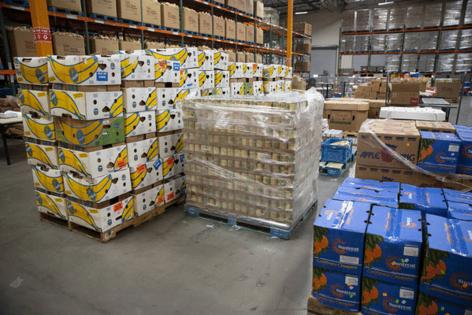131K Nevadans could lose food stamps because of 'One Big Beautiful Bill,' state officials say
Published in News & Features
More than 131,000 Nevadans could lose food and nutrition benefits because of the “One Big Beautiful Bill,” officials said during a Nevada legislative committee meeting Wednesday.
New work requirements and other changes to eligibility for the Supplemental Nutrition Assistance Program (SNAP), commonly known as food stamps, could put those Nevadans at risk, officials with the Nevada Department of Human Services told lawmakers at an Interim Finance Committee meeting Wednesday. An estimated 10,000 or more people could lose benefits based on changes to social services access for non-citizens.
The discussion came out of an additional budget funding request from the Division of Social Services, which sought more than $244,000 to fill a shortfall tied to increased operating expenses from use of a federal income verification system that was previously available to the state for free.
Senate Majority Leader Nicole Cannizzaro said she worries the federal changes to SNAP eligibility and administrative costs for the program could take away vital services from Nevadans.
“We are talking about feeding families, and to me, we are doing it well, but we’re still in a position where we’re going to have to cut back services, where we are going to have to take that food from those families, and where we’re going to have to come up with additional money because of this federal piece of legislation,” Cannizzaro, D-Las Vegas, said.
Impact of SNAP changes
Nevada had an average of 505,000 recipients of Supplemental Nutrition Assistance Program (SNAP), commonly known as food stamps, in 2024. Policy changes included in the new federal law, passed in Congress earlier this summer and signed by President Donald Trump on July 4, include shifting more of the cost burden to states while also changing eligibility requirements for beneficiaries.
One impact of the law is a change in addressing error rates by state. The federal government previously covered all of a state’s SNAP benefits. But the new law requires states with an error rate — the percentage of benefits that are over or underpaid — at or above 6% to cover between 5% and 15% of total benefit costs starting in 2028.
Nevada’s error rate typically fluctuates around 6%, one of the lowest rates in the country, according to Kelly Cantrelle, deputy administrator at the Nevada Division of Welfare and Supportive Services, but it it currently sits around 7%.
At that rate, the state would need to cover 5% of SNAP benefits, which could cost the state about $55 million each year, Cantrelle said.
Cantrelle said the state is implementing new requirements for staff and for SNAP applicants to reduce error rates.
Under the “One Big Beautiful Bill,” the federal government is also expanding work requirements to qualify for SNAP assistance. Able-bodied adults ages 18-64, previously 18-54, must now work or participate in job training for 80 hours each month. Additionally, parents with children 14 and older are no longer exempt from the work requirements.
Another impact the law could have on Nevada’s SNAP benefits is a change in who covers administrative costs. In October 2026, the federal government will reduce its contribution to state administrative costs from 50% to 25%.
Thompson said that reduction would translate to rough $19 million less in operational funding during the 2025-2027 two-year budget cycle.
Sen. Robin Titus, R-Wellington, said that losing SNAP assistance did not necessarily mean that Nevadans would lose access to food. Titus suggested the Division of Social Services may need to refer more people to community partners, such as food banks, instead.
“We’re not going into anybody’s home and taking away food, correct?” Titus asked.
But Democrats responded the new SNAP eligibility requirements could force Nevadans to turn to food banks, which may not be able to meet the heightened demand. The U.S. Department of Agriculture ended funding for two locally sourced food options for Nevada schools and food banks in March.
Food banks in Nevada say they have already had to scale back their food distribution systems to stretch their resources. About 1 in 6 Southern Nevadans are food insecure, according to an annual report from Three Square food bank.
“When we get into semantics and we want to say nobody’s going into someone’s home to get their food, if I can’t myself go to the store and put food on my table for any reason, whatever it is, there’s not food on my table,” said Sen. Marilyn Dondero Loop, D-Las-Vegas.
_____
©2025 Las Vegas Review-Journal. Visit reviewjournal.com.. Distributed by Tribune Content Agency, LLC.







Comments